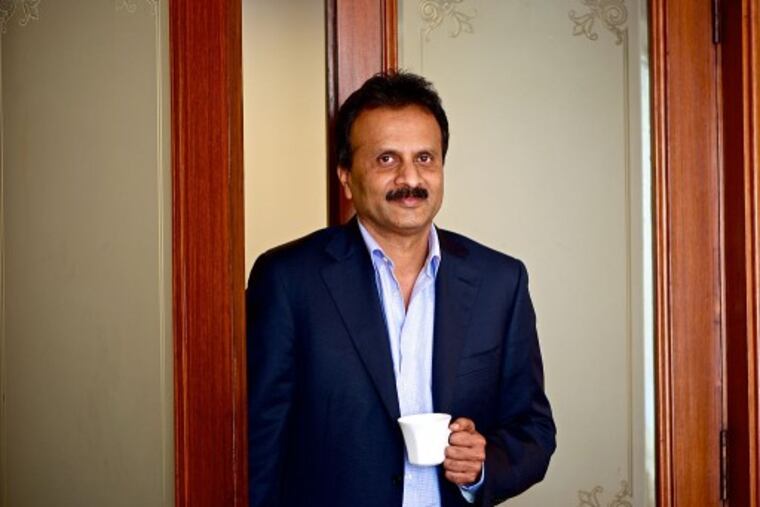PhillyDeals: Why city can’t rest on its rep as a ‘Cradle of Cures’; Judge moves RICO case against a school pension manager towards trial
Another promising, well-funded -- and already Philly-based -- biotech developer, Century Therapeutics, announced that it, too, is opening its own R&D lab in a biotech hotspot -- all the way across the country, in Seattle.

Tuesday morning, I wrote about how Princeton-based Amicus Therapeutics, a publicly traded biopharmaceutical firm focused on rare diseases, had opened a University City building with its name on the roof.
The site is soon to be home to all 200 Amicus R&D professionals (and they’re hiring more), because chief executive John Crowley sees the Penn-CHOP neighborhood as the “Cradle of Cures," a “magnet for gene technology and gene therapy,” with “the world’s leading research center" in the field.
But here’s an example of why Philly can’t rest on its laurels:
Later that day, another promising, well-funded -- and already Philly-based -- biotech developer, Century Therapeutics, announced that it, too, is opening its own R&D lab in a biotech hotspot -- all the way across the country, in Seattle.
In a statement, Century called Seattle "a growing center of excellence for cell therapy, with the key advantage of Seattle-based leadership by Dr. Hyam Levitsky,” who held the top research job at Juno Therapeutics, which works closely with Seattle Childrens’ Research Institute, as Amicus works with Penn. Celgene bought Juno for $9 billion last year, another sign of the big fortunes at stake when these therapies start translating into sales.
It’s not that Levitsky doesn’t know Philly -- he is a Penn Engineering grad, with an M.D. from Johns Hopkins in Baltimore. But Levitsky can pick his city, and he agreed to join Century as president of R&D, without having to move here; the lab will be built around him on the other coast.
Century is smaller than Amicus -- it currently employs 50 -- but is poised for rapid growth: The company raised $250 million last year from German drugmaker Bayer, Fujifilm Cellular Dynamics Inc., and San Francisco-based Versant Ventures.
Century targets blood cancers and solid tumors using adult stem cells altered and reproduced on an industrial scale through Century’s proprietary processes.
It plans to keep its headquarters office in Philadelphia, along with top executives including chief scientific officer Luis Borges.
Back to court: Last year I wrote about how PSERS, the Pennsylvana school pension system, in its quest for worldwide profits had agreed to send $300 million into a fund managed by Hong Kong-based SSG Capital Management, to buy private companies in India.
I noted at that time that SSG’s founders, Hong Kong-based Wong Ching Him (Edwin Wong) and Andreas Vourloumis, and Singapore-based Shyam Maheshwari, had been sued in federal court in Pittsburgh by Kyko Global Inc., a court-appointed receiver.
The receiver accused the SSG founders of conspiracy and violations of the federal Racketeer Influenced and Corrupt Organizations (RICO) Act in helping a former client rip off $35 million from her Pennsylvania software company, and keep some for themselves, around the time they started SSG.
If the receiver prevails, it hopes to collect treble damages under RICO, which could top $100 million.
Though it didn’t make it into PSERS’s published memo and consultant report recommending the board invest the $300 million, PSERS staff knew about “these legal matters,” and had produced a “confidential written report on the lawsuit’s allegations," not made public, which “strongly asserts these matters will not have an impact on SSG’s ability to manage PSERS’s investments,” a spokesman, Steve Esack, told me at the time.
But on Tuesday, federal judge William S. Stickman IV weighed in with an 84-page opinion that tossed out, not the lawsuit, but the SSG founders’ attempts to argue that the case lacked merit or the court lacked jurisdiction.
According to Stickman, the receiver has made “sufficient” arguments that the SSG founders “participated, either directly or indirectly,” in an enterprise that showed “a pattern of racketeering activity,” so the case may proceed toward trial.
That is still a long way from a finding of guilt or innocence.
”SSG respectfully disagrees with Judge Stickman’s recent procedural ruling, said Richard Yee, SSG managing director and general counsel, in an e-mail. “However, it is important to note that his recent ruling was just that, procedural, and not a judgment on the merits of these unfounded lawsuit claims. SSG will continue to strongly defend itself against these baseless claims in court.”
As far as it goes, the ruling “destroys SSG’s position that Kyko’s claim are without merit,” and “underlines the seriousness of the allegations,” according to Tejesh Srivastav, an India- and New York-based investment adviser who has been following the case. He said the decision also bolsters criticisms by Pennsylvania Treasurer Joe Torsella, who often votes against private investments, and told the London Financial Times last year that the state would “save a fortune” if it stopped hiring high-fee private investment managers, who he says typically do no better than cheap index funds; which PSERS staff disputes.
Spokesperson Esack said that SSG’s recently announced sale to Hong Kong- and Los Angeles-based Ares Management Corp., another company that manages investments for PSERS, “remains on track," and referred further questions to Ares, whose spokesperson had no immediate comment.